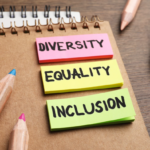
Commercial Awareness Update – W/C 16th September 2024
September 16, 2024
National Inclusion Week 2024: How to Create Lasting Change in the Legal Profession
September 19, 2024By Isha Amir.
Reading time: four minutes
This article explores the significance of International Equal Pay Day, the legal frameworks shaping the fight for wage equity, and how future lawyers can drive change in closing the gender pay gap.
The Global Significance of International Equal Pay Day
International Equal Pay Day shines a much-needed spotlight on one of the most pressing issues of our time: the persistent gender pay gap. Celebrated annually on 18th September, this day serves as a global reminder that despite decades of progress, women around the world still earn significantly less than men for doing the same work. Established by the United Nations to draw attention to the persistent gender pay gap, this day highlights the economic disparities that continue to affect women worldwide. Despite progress, women on average still earn 20% less than men globally. International Equal Pay Day is a reminder of the urgent need for action, urging governments, businesses, and individuals to unite in the fight for equal pay for work of equal value, making fairness in the workplace a reality for all.
Law & Order: Equal Pay Edition
This topic is important and therefore it is protected though a legal framework which plays a crucial role in the fight for equal pay, providing the foundation for enforcing wage equality across the globe. At the heart of these efforts is the International Labour Organization’s (ILO) Equal Remuneration Convention of 1951, a landmark treaty that established the principle of “equal pay for work of equal value.” This convention obligates member states to ensure that men and women receive equal pay for jobs that require similar skills, responsibilities, and working conditions. It also emphasises the need for proactive measures to eliminate discrimination in wage structures. Today, this convention continues to influence national laws and policies, serving as a powerful tool in the ongoing battle against the gender pay gap.
Why is this relevant to a law student?
Simply, it is practical and impactful for a law student to know this. Mastering these laws is essential for understanding the broader landscape of employment law and will equip you to address real-world issues like wage discrimination. This knowledge not only opens doors to careers in corporate law, advocacy, and policymaking but also empowers you to contribute meaningfully to social justice and reform.
So, get involved!
There are several ways for you to get involved, joining or supporting National Organization for Women (NOW) or Gender Justice allows students to contribute to impactful campaigns and legal reforms. dditionally, participating in research or outreach programs with the European Institute for Gender Equality (EIGE) can deepen understanding and enhance practical skills. These experiences not only bolster a law student’s expertise but also foster a meaningful impact in advancing pay equity.
Law students have a unique opportunity to drive meaningful change in the quest for equal pay by engaging with leading organisations and participating in advocacy, research, and policy reform. By actively contributing to these efforts, students can enhance their legal expertise while making a tangible difference in the pursuit of wage equality.





